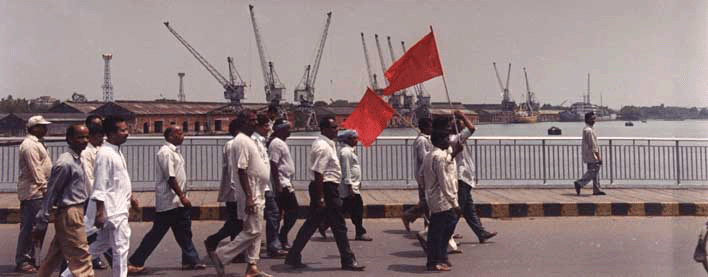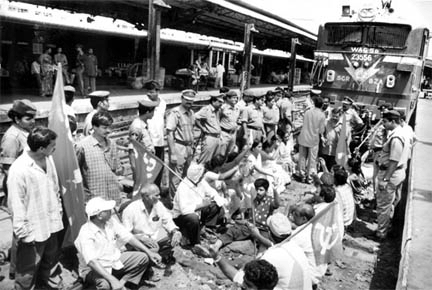 People's Democracy
People's Democracy
(Weekly
Organ of the Communist Party of India (Marxist)No. 21
May 25, 2003
(Weekly
Organ of the Communist Party of India (Marxist) |
Vol.
XXVII
No. 21 May 25, 2003 |
May 21, 2003 – A Glorious Day of
Resistance
Nationwide
General Strike, A Resounding Success
MAY
21, 2003 will go into history as a glorious day in the resistance movement
against the Vajpayee government’s anti-people and anti-worker policies. The
day witnessed one of the biggest all India strikes in the history of independent
India. With the workers determined to ensure that the government gets their
warning, there was tremendous response to the strike call across the country. A
total bandh was enforced in eight states – West Bengal, Kerala, Tripura,
Andhra Pradesh, Bihar, Jharkhand, Goa and Pondicherry. According to information
reaching at the time of writing these lines, more than 6,000 activists were
arrested and the Police had resorted to lathicharge in 16 places. In many other
states, a bandh-like situation prevailed due to the strike.

A view of Kolkata port on May 21
Operations in all the ports of the country
were severely affected because of the strike.
Banking operations in the country came to a grinding halt. Crucial
industries such as oil, power, coal, steel, engineering and textiles experienced
massive participation in the strike. Despite the intimidation by the management,
the employees of the Reserve Bank of India struck work along with the officers
and employees in all commercial banks. Lakhs of unorganised sector workers also
joined the strike throughout the country.

Rail roko in Vishakapatnam
Supporting
the workers on strike, lakhs of kisans, agricultural workers, students, youth
and women staged actions like rasta roko/rail
roko in several parts of the country, resulting in wide-spread disruption of
public transport.
There
are also reports of large-scale resort to intimidatory measures, arrests, etc by
the police in different states to prevent the workers and others from joining
the strike. The strikers bravely countered these measures.
Congratulating
the people for making the strike a big success, the central trade unions, which
had called for the strike, have clearly stated that if the Vajpayee government
refuses to heed this warning of the people and change its policies, then they
will throw this government out.
At
a press conference at the Press Club in New Delhi, the leaders of the CITU, AITUC, HMS,
AICCTU, TUCC, UTUC and UTUC-LS expressed confidence that they will be able to
rebuff the government’s anti-people policies.
M
K Pandhe, CITU general secretary, while congratulating the people, informed that
soon there would be a meeting of the central trade unions and independent unions
and federations to chalk out the next phase of action programme in pursuance of
the common demands. He said that the trade unions are willing to have a dialogue
with the government on these issues at the level of prime minister or any other
union minister, but if the government remains adamant on pursuing these policies
then they will bitterly fight back.
Pandhe
sharply criticised the attitude of INTUC and BMS towards this strike. “They
have in written supported the demands of the strike. If the demands are in the
interest of the nation, then how can the strike be anti-national or politically
motivated, as alleged by these unions? Their policy is like running with the
hare and hunting with the hound. This is not a correct stand,” said Pandhe. He
informed that in many places workers belonging to and unions affiliated to the
INTUC and BMS participated in the strike ignoring their leadership’s decision.
He appealed to the leadership of the INTUC and BMS to come forward to join the
mainstream of struggle, at least from now on.
Gurudas
Dasgupta, AITUC general secretary, said that this strike was in effect a fight
for the nation. It was not limited to any economic demands and was on issues
concerning millions of toiling people of the country. He charged the union
labour minister of speaking untruth by saying that the trade union leaders
refused to meet the prime minister. “The minister sought an appointment for us
with the PM right in front of us and surprisingly the PMO refused it. This was
the actual reality,” said Gurudas Dasgupta.
Umraomal
Purohit (HMS) said that all the organisations which participated in the strike
are committed to carrying forward this struggle until the demands are met.
1.
Halt
to privatisation of profit making and potentially viable public sector
undertakings.
2.
No change in the labour laws in
favour of the employers and against the interest of the workers.
3. Immediate enactment of a
comprehensive legislation for agricultural workers.
4.
No to policies that are leading to
severe aggravation of joblessness and unemployment.
5.
A comprehensive social security
schemes for all, including the workers in unorganised sectors.
6.
Restoration of quantitative restrictions on imports, which
are proving increasingly detrimental to our economy.
7.
Amendment to the Payment of Bonus Act by removing all ceilings.
8.
Restoration of 12 per cent interest rate on provident fund
deposits.
(INN)